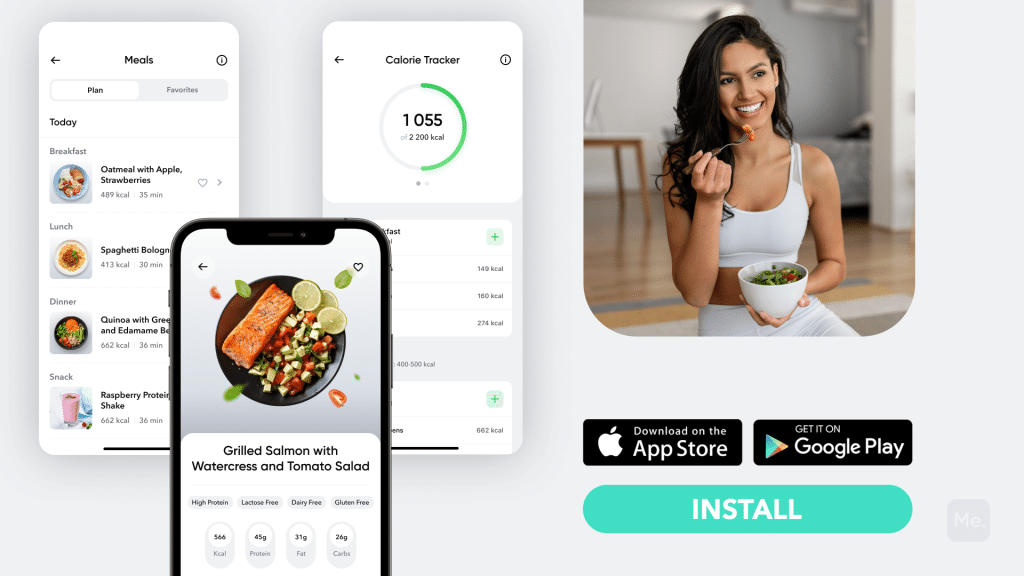The question ‘why do I overeat’ is one that bothers many people who are trying and failing to get their eating habits in order. If you have been trying to control your appetite or portion sizes but are finding it hard, then the first thing you need to know is that you are not alone.
In this article, we will cover what causes overeating, how to differentiate overeating and food addiction, as well as give you tips on how to control your appetite and habits when you just can’t stop eating.
Understanding The Differences Between Overeating, Food Addiction And An Overeating Disorder
At a glance, these three factors may look like the same thing – after all they mostly involve eating copious amounts of food. This, however, is not true. Here is how they differ:
- Overeating. The MD Anderson Cancer Center, defines overeating as the act of eating too much. When you eat too much, your stomach expands beyond its normal size to adjust to the large amount of food. This expansion then causes the stomach to push against other organs, making you uncomfortable – this discomfort then leads to you feeling tired, sluggish or drowsy and would make you undo a button in your pants to accommodate the stomach’s bigger size.
- Food Addiction. The topic of food addiction is a contentious one. Some define it as a disorder which can cause loss of control over the ability to stop eating certain foods. A 2014 article by The Huffington Post compared this to alcoholism.
It further stated that like alcoholics, those addicted to some foods often have rules set in place to prevent them from consuming the foods they are addicted to and if they start eating the food in question, it is extremely hard for them to stop. In the same year, however, one scientific review stated that food addiction should be seen as an eating addiction instead as it is a behavioral addiction rather than addiction to a particular substance. (2).
- Overeating Disorder. Unlike simple occasional overeating, an overeating disorder – also known as binge eating disorder – is a serious condition that involves recurrent episodes of consuming large quantities of food. People suffering from BED will frequently consume unusually large amounts of food and feel unable to stop eating (5).
Read More: Six Meals A Day Diet Plan: Will It Actually Keep Your Metabolism Humming?
What Causes Overeating?
The reasons for overeating are often unique to the individual. However, there are some common reasons that could sometimes lead people to eat too much. They are as follows:
- Mindless Eating. You often consume your meals with a distraction e.g. you eat while working, playing on your phone, or watching tv.
- Emotional Eating. You often use food to cope with strong emotions like anger, sadness or even hunger.
- Stress Eating. Stress weight gain is a common occurrence among many. Not only do we tend to eat to the excess while stressed, but many people also never make smart food choices during this time.
- Meal Skipping. When you skip meals during the day, you are most likely to overindulge later when you get the chance to eat.
- Food Restriction. A diet that is overly restrictive tends to lead to overeating. The body responds to not getting enough nutrients and/or energy by driving you to eat more.
FAQs
-
Why Do I Overeat At Night?
When most people think about why they might be eating too much at night, the first thought in their minds might be that it is as a result of serious eating disorders such as binge eating disorder and night eating syndrome. While it is true that nighttime eating has been linked to these illnesses (1, 6) most of the times eating too much at night is simply due to having an overly restricted daytime food intake.
If you have been dieting to lose weight and have been severely restricting how much you eat during the day, your body will force you to eat at night, whereby you will be ravenous, which quickly leads to overeating.
This theory was demonstrated by a 2017 study done on children. In the study, researchers in Greece observed the eating habits of school going children aged between 9 to 13 years old. The researchers found that the children who often ate too little at breakfast, or skipped the meal altogether tended to eat much bigger meals at night and were more likely to be obese as compared to their counterparts who did not do this (4).
If you tend to let yourself off the hook, raise the white flag when things get tougher than you expected, send yourself on an unconscious binge-eating trip – BetterMe app is here to help you leave all of these sabotaging habits in the past!
-
Why Do I Overeat When Bored?
It could be because you are an emotional eater. Emotional overeating is the act of responding to your emotions by turning to food. According to psychologytoday.com, while boredom is a feeling like any other, it is also a signal that alerts us to the fact that, for some reason, we can’t or won’t engage in a more meaningful activity.
A study in Frontiers In Psychology also agreed with this. In their 2015 study they stated that boredom increases eating in an attempt to distract from ‘an appraised lack of meaning in the present situation and in life’. The study also suggested that emotional eating, especially due to boredom, is often experienced among people high in objective self-awareness (3).
Psychologytoday.com suggests that the simplest way to overcome emotional eating when you’re bored is by learning how to differentiate true hunger and emotional hunger. True hunger is signified by when your stomach actually feels empty – when this happens you are not picky about what you will eat. As long as it’s edible and will satisfy you it will work.
On the other hand, boredom eating is very specific. You will often have a craving for a specific type of food and have no desire to eat anything else.
-
Why Do I Always Overeat At Dinner?
If you are overeating at night because you feel absolutely ravenous, then the most likely cause of this is because you are overly restricting your calorie intake during the day or have skipped a meal or two during the day.
Do not be quick to assume that it is a sign of either binge eating or nighttime eating syndrome. Remember that these are serious mental health and eating disorders that should not be self-diagnosed and people with these disorders often eat when they are not hungry.
Webmd says that to differentiate between these two overeating disorders is to not that:
- Binge eating is an overeating disorder that often occurs when people use food to try and numb emotions such as anger or sadness. They often have a lot of food in a short period of time
- With nighttime eating syndrome, people will often wake up several times in the night to grab a meal or snack to soothe insomnia and help themselves fall back asleep.
As you can see, none of these two issues are restricted to dinner time and thus if your question is only limited to ‘why do I always overeat at dinner time’ then you should look at your daytime eating habits. Maybe you simply aren’t eating enough throughout the day.
Read More: Vitamins To Boost Metabolism And Rev Up Fat Loss
-
Why Do I Overeat After Exercise?
According to aaptiv.com, the act of overeating after exercise is usually as a result of the activation of the sympathetic nervous system. Once this is triggered it affects the cardiovascular system, hormones, and even the metabolic responses. The need to eat and sometimes overeat is caused by the metabolic spike which demands that we refuel our depleted energy levels by eating (7).
If you are looking for tips on how to stop overeating after a workout, here are some things that could be beneficial to you:
- Timing. Try to schedule your workouts before meal time in a way that once you are done you can immediately eat your lunch, breakfast, or dinner, which will easily prevent you from consuming any extra calories.
- Stick to only eating wholefoods after a workout. They are full of fiber which helps keep you fuller for longer. You should also try to eat some lean protein after a workout as the macronutrient also helps keep you full and is necessary for muscle repair and recovery.
- Drink water. If you cannot get to a meal immediately after your session, try filling up on water instead of sugar filled energy drinks, soda, or sports drinks. Not only is water calorie free, but it also works as an appetite suppressant which will hold you over for some time until you can get to a nutritious meal. Plus you need to rehydrate after your workout.
How To Stop Overeating?
If you would like to put an end to this overeating cycle, here are some thing you can do to put an end to this:
- Never skip meals. Set a timer/reminder that will remind you to eat.
- Practice portion control. Some tips on how to control portions include using small plates, eating slowly, using your hands to estimate your portion sizes, eating more vegetables, etc.
- Practice mindful eating and learn to listen to your hunger and fullness signals.
- Always drink water – throughout the day and before meals.
The Bottom Line
The answer to ‘why do I overeat’ has many answers but at the end of the day, unless it is a diagnosed eating disorder, you have the power to put an end to excessive food consumption. Chances are if you do simple things like taking note of your portions, stop skipping meals or highly restricting your food intake, or even timing your workouts with meal times, you will eventually stop eating to excess.
DISCLAIMER:
This article is intended for general informational purposes only and does not address individual circumstances. It is not a substitute for professional advice or help and should not be relied on to make decisions of any kind. A licensed physician should be consulted for diagnosis and treatment of any medical conditions. Any action you take upon the information presented in this article is strictly at your own risk and responsibility!
SOURCES:
- Binge eating disorder and night eating syndrome: a comparative study of disordered eating (2005, pubmed.ncbi.nlm.nih.gov)
- “Eating addiction”, rather than “food addiction”, better captures addictive-like eating behavior (2014, sciencedirect.com)
- Eaten up by boredom: consuming food to escape awareness of the bored self (2015, ncbi.nlm.nih.gov)
- Late-night overeating is associated with smaller breakfast, breakfast skipping, and obesity in children: The Healthy Growth Study (2017, pubmed.ncbi.nlm.nih.gov)
- New in the DSM-5: Binge Eating Disorder (2013, nationaleatingdisorders.org)
- Optimal management of night eating syndrome: challenges and solutions (2015, pubmed.ncbi.nlm.nih.gov)
- Sympathetic nervous activity during exercise (1983, pubmed.ncbi.nlm.nih.gov)










